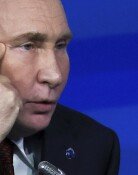Financial experts warn of a Russian default
Financial experts warn of a Russian default
Posted March. 15, 2022 08:01,
Updated March. 15, 2022 08:01
The Russian government has admitted that it is facing a potential default amid the growing risk of financial instability fueled by its invasion of Ukraine. The international financial circles predict that March 16 when Russia is due to pay a total sum of 117 million U.S. dollars of sovereign bonds interest should mark the Kremlin’s first default crisis. If Russia fails to service the interest on time, it might face a national bankruptcy after a 30-day suspension period.
According to Reuters, Russian Finance Minister Anton Siluanov admitted that Russia has lost access to almost half of its foreign reserves owing to the sanctions by the West. “The total volume of our reserves is about 640 billion dollars, and about 300 billion dollars are in such condition that we can’t use them now,” he told Russian state television in an interview on Sunday. He also added that Russia will repay debt in rubles until its cash pile is unfrozen as it is infeasible for now to pay back the debt with the dollar, Russia is resorting to the rubles whose value plummeted 50% over the past couple of months. It remains unclear whether global investment banks will accept such a deal. “The specter of Russia defaulting on external bonds is looming”, Reuters said, adding that it would be the first major default since the years following the 1917 Bolshevik revolution.
Managing Director of the IMF Kristalina Georgieva said on CBS’s “Face the Nation” that a Russian sovereign default is no longer “improbable.” She said Russia has the money to service its debt, but cannot access it, pointing out a significant sum of Russian foreign reserves is currently frozen under Western sanctions. The IMF managing director analyzed that the abrupt contraction is affecting the Russian economy, and that purchasing power of the Russian population has significantly diminished owing to the depreciation of the ruble, predicting a deep recession this year.
International rating agencies are also warning of a potential Russian default. Fitch Ratings downgraded Russia’s credit to “C,” saying the country is at an “imminent” risk of defaulting on its debts. The World Bank’s chief economist Carmen Reinhart warned that Russia is “mightily close” to default.
Given the relatively small size of the national debt and Russia’s connection with the global economy, however, many experts predict that even if it defaults on its debt, the consequences would be marginal. Another example is Russia’s declaration of moratorium in 1998 when it had no money to repay its debt, which draws a contrast with the current situation where Russia does have money though it is denied access to it owing to sanctions. When asked about the impact a Russian default might have worldwide, IMF Managing Director Georgieva also said it would not trigger a global financial crisis.
Jae-Dong Yu jarrett@donga.com
Headline News
- Biden authorizes Ukraine to use long-range missiles against N. Korea's troop deployment
- Democratic Party criticizes court in charge of Lee’s case for ‘judicial murder’
- Jannik Sinner achieves remarkable success on tennis court
- Xi Jinping asks Yoon to visit China first
- Chey Tae-won appointed as chair of APEC CEO Summit







